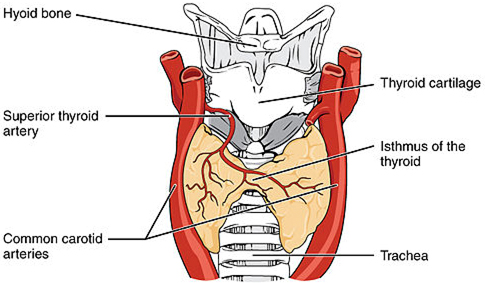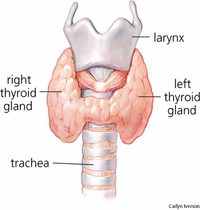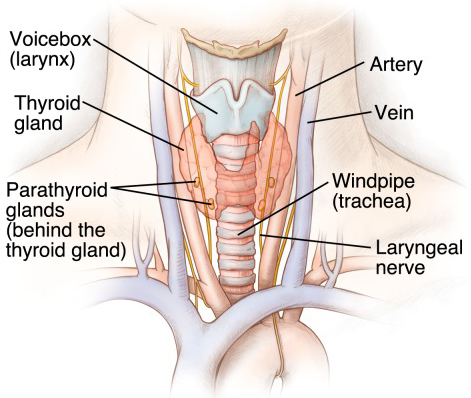Thyroid Treatment

The thyroid gland, or simply the thyroid in vertebrate anatomy, is one of the largest endocrine glands and consists of two connected lobes. The thyroid gland is found in the neck, below the thyroid cartilage . The thyroid gland controls how quickly the body uses energy, makes proteins, and controls how sensitive the body is to other hormones. These hormones regulate the growth and rate of function of many other systems in the body. T3 and T4 are synthesized from iodine and Tyrosine. The thyroid also produces calcitonin, which plays a role in calcium homeostasis.
Hormonal output from the thyroid is regulated by thyroid-stimulating hormone (TSH) produced by the anterior pituitary, which itself is regulated by thyrotropin-releasing hormone (TRH) produced by the hypothalamus.
THYROID TWO TYPES:
- Hyperthyroidism (Abnormally Increased Activity)
- Hypothyroidism (Abnormally Decreased Activity)
Hyperthyroidism: (Abnormally Increased Activity)

Hyperthyroidism, or overactive thyroid, is due to the overproduction of the thyroid hormones T3 and T4, which is most commonly caused by the development of Graves’ disease, an autoimmune disease in which antibodies are produced which stimulate the thyroid to secrete excessive quantities of thyroid hormones.[22] The disease can result in the formation of a toxic goiter as a result of thyroid growth in response to a lack of negative feedback mechanisms.
SYMPTOMS:
- A thyroid goiter
- Protruding eyes (exophthalmos)
- Palpitations,
- Excess sweating,
- Diarrhea,
- Weight loss,
- Muscle weakness and unusual sensitivity to heat. The appetite is often increased.
Hypothyroidism (Abnormally Decreased Activity)

Hypothyroidism is the underproduction of the thyroid hormones T3 and T4.Hypothyroid disorders may occur as a result of congenital thyroid abnormalities (Thyroid deficiency at birth. See congenital hypothyroidism),
autoimmune disorders such as Hashimoto’s thyroiditis, iodine deficiency (more likely in poorer countries) or the removal of the thyroid following surgery to treat severe hyperthyroidism and/or thyroid cancer.
Symptoms:
- Weight gain
- Tiredness
- Baldness
- Cold intolerance and bradycardia.
- Hypothyroidism is treated with hormone replacement therapy, such as levothyroxine, which is typically required for the rest of the patient’s life.
- Thyroid hormone treatment is given under the care of a physician and may take a few weeks to become effective.
